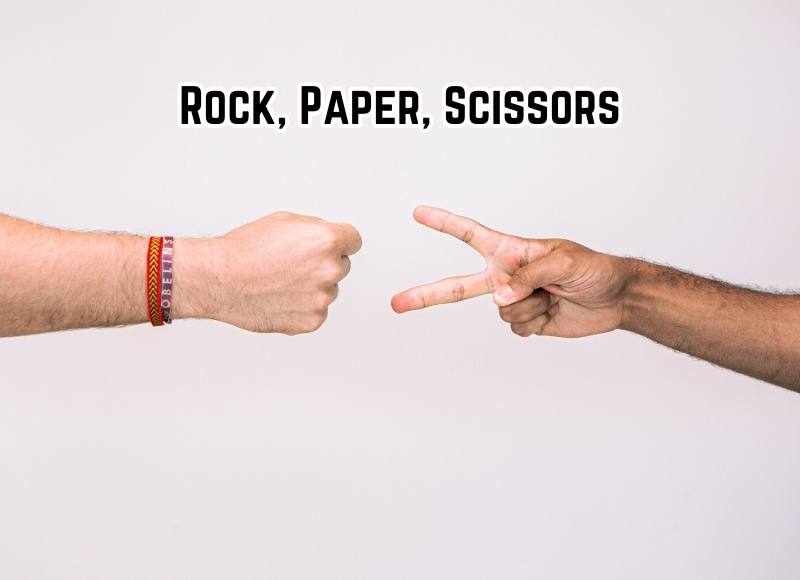Mastering the Art of Rock, Paper, Scissors: A Game of Chance or Strategy?
Alvish Asher
. 5 min read
Is it rock vs scissors this time, or can rock be hidden by paper? This is your last chance to avoid housework for a whole month. The chores will fall on your shoulders if your sister is victorious. You're counting down the last seconds before making the game-winning throw, and you've slowed down to consider your options. The Chinese Han period was the cradle of the rock-paper-scissors game. Its modern form emerged in seventh-century Japan, and by the early twentieth century, it had spread around the globe. So, whether you're playing against your sister or challenging opponents online, the contribution of developers has made rock-paper-scissors a global phenomenon enjoyed by millions.

There are Many Who Dismiss it as a Childish Game of Chance for Two
Others have referred to it as a psychologically sound strategy framework. For the most serious players, there are tournaments and competitions to participate in. If you want to be successful in winning one of them, you need to have some background knowledge. The game is based on certain elements of chance and some fundamentals of human psychology. You may think of four different outcomes. Scissors are broken by a Rock, the Rock is hidden by Paper, and the Paper is cut by the Scissors.
Mastering the Skills of Rock, Paper, and Scissors is a must
Never give yourself away and try to read your opponent like a book; that's rule number one. While learning to toss a rock or play scissors, inexperienced players generally clench their fists or slightly extend their index fingers. Also, making a move on someone who seems tired is the most revealing detail. Researchers have shown that rock is the most popular opening move. Well, so it's the first one. only for the sake of the competition. To that end, it's not unreasonable to conclude. Instead, they might listen to rock because it makes them feel like they have a firm hand on the instrument.
Paper should be your go-to weapon if you go up against a male opponent
Men are more likely to choose the rock on the first toss, according to another study; by throwing paper, you may throw off his approach. Scissors is a game of statistics. The rock is the most often thrown move, yet it is also the least used. This is why it is best to stick with tried and true methods like using paper. For example, if you played rock and your opponent chose paper, they would likely stick to their plan and play paper again, but you may be one step ahead of them by switching to scissors.
If you keep losing throws, try using the one that hasn't been used yet
If you played Rock and your opponent played scissors, and you won the game, your opponent will likely switch to playing paper the next time around. But, you are planning forward by one stage. Don't be afraid to play the same thing they just did, since they won't be expecting it. Losing a hand often results in a shift in approach, according to statistics. There's a chance your opponent may switch to a more advantageous strategy, such as switching to paper or scissors.
Skilled players may even throw blind
In this manner, they are able to ignore the other player's moves and keep their attention on their own approach. If you're in the first row and you win, congrats, and try a different strategy. As a general rule, losers will not continue to toss a losing hand and will instead play in a more orderly fashion. Then choose the option that would have given you the upper hand in the preceding toss. Hence, if you recently lost with paper, and want to try scissors, your opponent will likely stay with a prior winner and toss paper again.
And now you have yet more chance to fool them
Be unexpected and go for your second-to-last option. You have a great probability of winning if they switch because they think you will switch. If you're playing paper, scissors, rock, you shouldn't go for the scissors as your opponent expects you to. Instead, you should choose paper, which will force them to watch as your rock becomes coated in paper rather than blunting your scissors. Yet, rock-paper-scissors isn't entirely dependent on reason or calculation. The probability of success with these algorithms is low. Moreover, you have no guarantee that your competitor does not already possess this information.
Researchers in the Scientific Community
To the conclusion that players deliberately and unconsciously adhere to certain patterns. In the field of game theory, there is a concept called the conditional response. Those that come out on top are certain that their winning method will work again, while those who come up short are more likely to try something new. The Hangzhou, China, researchers of game theory recruited 360 students for a large-scale experiment, hoping for a more representative sample. After many hours of constant work, their objective was to play 300 rounds of rock, paper, scissors in teams of two.
You reached for the scissors and sliced through some paper
You'll make your opponent believe you're going scissor-to-paper again. As an alternative, you may throw a curveball by precisely replicating their last move. Together, mathematics and psychology form the basis of this tactic. Your paper reports that your sister is a rock star. For her, this is a surprising twist. It's her firm belief that you and your partner should carry on playing. So as to liven things up between the two of you, you offer her. In Malaysia, instead of throwing scissors, they throw birds. To create the bee shape, press the tips of all five fingers together.
The open hand represents the liquid that may be used instead of paper
Rock is your standard fare. Stone is no match for water since it floats above. The bird drank the water and then smashed it. The bird is pounded with a stone. The Indonesian version substitutes the thumb for the elephant, the index finger for the person, and the pinky for the ant. An elephant is superior than a person. The human conquers the ant, and the elephant runs away in terror. Because you two are having so much fun, you decide to invite some other individuals to join in.
The same principles are at work
As paper can be cut with scissors and rock cannot, paper would be the victor. For such a large gathering, I would suggest a total of 5 rounds. You can always add a theme if the game starts to drag. You may play rock-paper-scissors using your favorite fictional characters, academic institutions, or athletic teams instead of actual ones. They chose to honors the game's origin in Japan by giving it a Japanese name. It is able to quickly recognize and respond to situations.
Conclusion
The game of rock-paper-scissors has its origins in ancient China and its modern form emerged in Japan in the seventh century. Today, the game is enjoyed globally with tournaments and competitions. Winning at rock-paper-scissors requires some background knowledge in the elements of chance and human psychology. One must not give away any tells and try to read their opponent. Research shows that rock is the most popular opening move, while men tend to choose rock on the first toss. Using paper against male opponents is recommended. Skilled players may even throw blind, ignoring their opponent's moves and focusing on their own approach. In the end, rock-paper-scissors is a fun game enjoyed by people of all ages and cultures.
More Stories from
A Glance into the Rich Tapestry of Indian History
This article provides a captivating overview of Indian history, spanning from the ancient Indus Valley Civilization to modern times.
The Indian Army: A Resilient Force Safeguarding the Nation
The Army remains steadfast in its commitment to safeguarding the nation's security and responding to diverse challenges.
The Enchanting Rhododendron: Himachal Pradesh's State Flower
Discover the captivating Rhododendron, the state flower of Himachal Pradesh, India. This vibrant evergreen shrub, native to the Himalayas, paints the landscape with breathtaking colors each spring.
Exploring the Uncharted: Speculative Insights into the World Beyond 2021
This article provides a brief overview of potential geopolitical shifts, technological advancements, environmental concerns, health challenges, economic developments.
Racial Justice and Inclusivity: Promoting Equality in Society
Explore the vital journey towards racial justice and inclusivity as we uncover the challenges faced by marginalized communities and the transformative power of inclusivity.











.png?width=40&aspect_ratio=1:1)

.png?width=40&aspect_ratio=1:1)